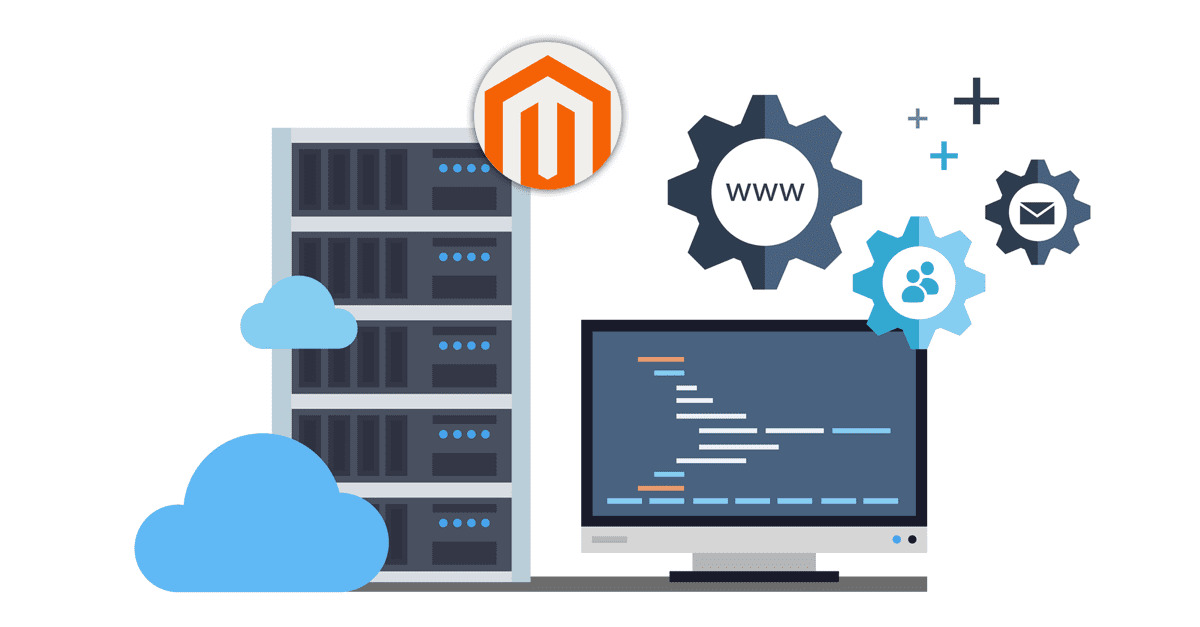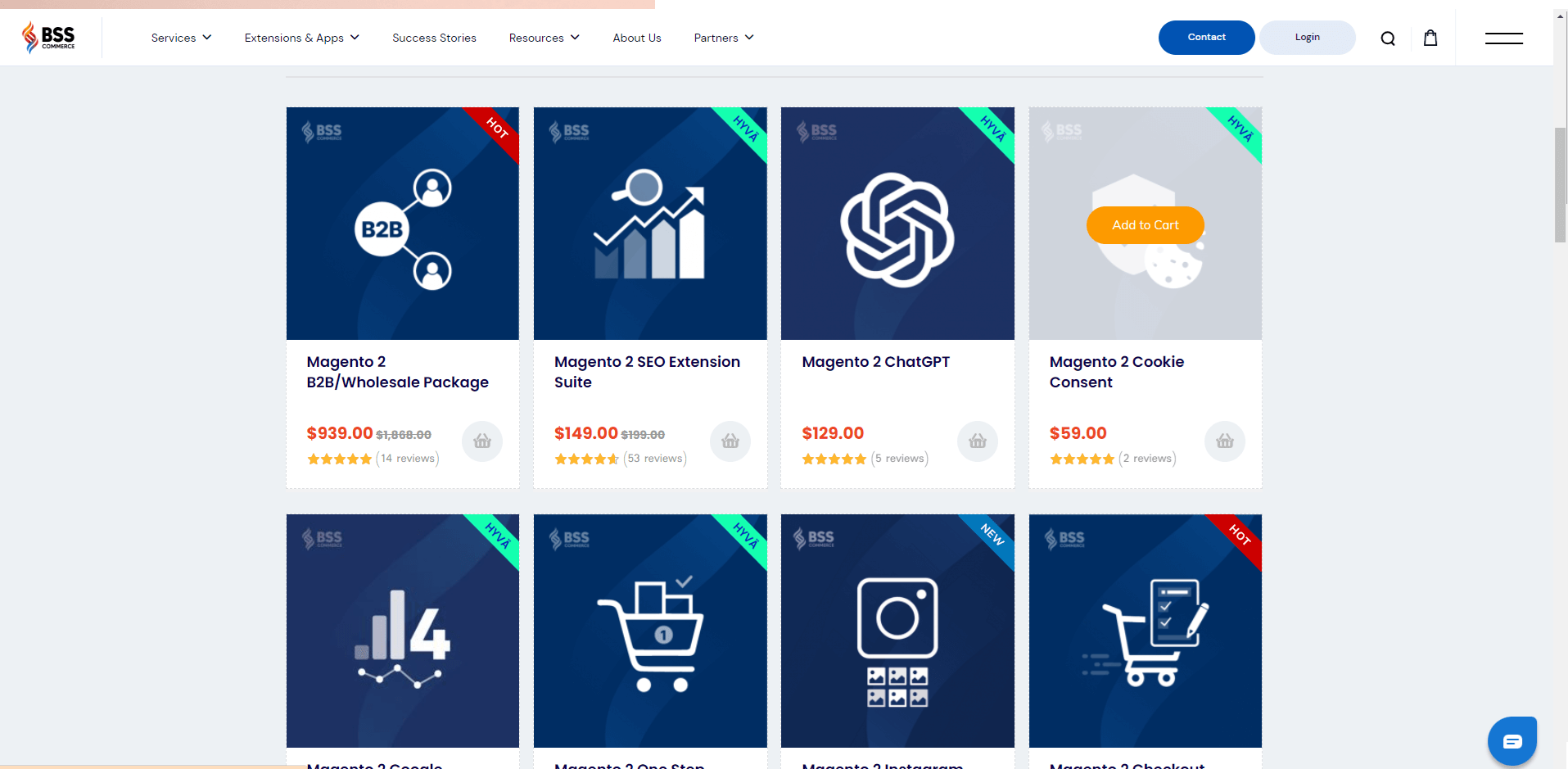Boasting over 150,000 active installations, Magento is one of the biggest eCommerce platforms in the world. Big brands like Nike, Ford, Vizio, BVLGARI, and K-Swiss operate their shops on this platform. Despite this, setting up a Magento store can be confusing, especially when it comes to pricing. That’s why many business owners hesitate to start selling on this eCommerce platform.
Relax, we’ve got this. This Magento pricing article will walk you through Magento pricing and all the associated costs and fees. With this detailed guide, you will have a clear understanding of what investment expenses you should be ready for, and be able to make a thoughtful decision on whether to run a Magento store or not.
All The Magento Costs That You Need To Know
Table of Contents
Recognized as a leading eCommerce platform by Techliance, Magento stands out as a high-performance and scalable solution for small to large businesses. Magento’s open-source architecture can tackle high traffic volumes while ensuring optimal speed and functionality. Along with its user-friendly interface and extensive customization options, it is no wonder that Magento is among the top online store builders that merchants migrated to the most.
However, setting up a Magento store is not an easy task. When trying to answer the question of how much does Magento cost, there are many aspects to consider, from basic expenses like license fees, hosting costs, and domain pricing to additional considerations like marketing and third-party development costs.
Below is a full breakdown of the nine main factors that affect Magento 2 pricing.

Magento License Fee
As of 2024, the Magento platform provides three editions: the Magento open source, Magento Adobe Commerce and Magento Adobe Commerce Cloud. Each model caters to different business needs.
Magento Open Source: Formerly known as Magento Community Edition, this is the platform’s cost-free, open-source version. It offers Magento’s basic features to run an eCommerce store, such as mobile optimized shopping, global selling, catalog management, and customizable content sections.
No license fee needed, Magento Open Source edition is perfect for individual entrepreneurs, startups and small to medium-sized businesses looking to check the features and platform’s functionalities at minimal cost. However, this version doesn’t include server hosting, domain registration, and SSL certificate costs yet. Technical support is also unavailable.

Here is an example of a web store built on Magento Open Source.
Magento Adobe Commerce (renamed from Magento Commerce): This is the platform’s premium, paid version. In comparison to the open-source edition, it offers more advanced features for running a more efficient online store, including more customization options and technical support. Yet, this version comes with a license fee. With extended functionality, it suits best for larger businesses with less than $1 million in annual revenue.
Magento Adobe Commerce Cloud (formerly Magento Commerce Cloud): This edition is essentially the Commerce version with cloud hosting. Alongside the features of the Commerce version, it adds automated backups, security patches, and integrations to the package. This edition is ideal for large businesses (preferably earning $1 million per year) seeking a scalability solution and a better management system.
So, how much is Magento Commerce? Magento Commerce pricing starts at $22,000 per year, while the Cloud version comes at $40,000 per year. However, these figures may vary based on your gross revenue.

Bvlgari runs their eCommerce store on a Magento Commerce license.
Hosting Cost
Every active website needs a hosting provider to store your website’s data and make it accessible to visitors. This goes the same with Magento. Except for the Adobe Commerce Cloud version that includes a hosting option in its package, you will have to handle the hosting separately from your license.
The hosting cost refers to the fee you have to incur to rent a space from a web hosting company’s servers. Depending on the providers, number of servers and your needs, the monthly hosting fee can range from $15 to $300 or higher.
As of today, Magento allows four hosting types: shared hosting, dedicated hosting, VPS hosting, and cloud hosting. The first three types fall under the umbrella of traditional hosting. Opting for this hosting service, your website’s data will be stored on a physical server. In contrast, cloud hosting uses a network of virtual servers for resources. This offers a more flexible and scalable solution.
The following table shows the pros, cons, and differences between the four hosting types.
| Shared Hosting | VPS Hosting | Dedicated Hosting | Cloud Hosting | |
| Description | The most basic hosting type. Share resources with other websites. | Virtual partition of a hosting server. Essentially shared hosting, but the main server split into many interconnected web servers, so each individual website is customizable. | Entire hosting server dedicated to your website only. Highest level of control and performance. | Network of virtual servers. Use a network of virtual servers for resource balancing. |
| Pros | Low cost due to shared cost, easy to set up | More control and performance than shared hosting | Exceptional uptime rate and security | Scalable, reliable, high availability |
| Cons | Limited resources, performance affected by other websites | Not as budget-friendly as shared hosting, some technical expertise is needed | Higher cost and necessitates technical expertise | Potentially higher cost, may require some technical knowledge |
| Best for | Small websites with basic needs | Growing websites, applications with moderate resource needs | Websites with large databases, high transaction volumes, or resource-intensive applications | Websites with fluctuating traffic, growing businesses |
| Not ideal for | High-traffic websites, applications with high resource needs | Websites requiring very basic needs | Websites with minimal technical knowledge | Small websites with very basic needs |
Aside from the base hosting fees, you should be aware of hosting-related costs, such as SSL certificates, domain registration, databases, backup services, CDN usage and caching fees. These extra expenses can easily drag your budget, so calculate the Magento eCommerce cost and choose the trustworthy hosting service for your store. To save you precious time, we have done a thorough research and compiled a list of the best Magento web hosting providers here.

The actual Magento price also involves the hosting fee.
Domain Pricing
There are two kinds of domains you can buy for your eCommerce business: the brand new domains and expired domains. Similar to hosting fees, the domain prices vary based on many factors. On average, a domain name will cost between $10 and $500 per year.
New domains: A new domain is a web address that has never been registered before. That means you are free to build your site and brand image as you want. Yet, it will take some effort to develop a solid online presence and build things from scratch. Furthermore, brainstorming a unique and memorable domain name can be challenging.
Expired domains: An expired domain, on the other hand, refers to a previously registered web address but has not been renewed. They are generally cheaper than new domains. In addition, you can benefit from their pre-existing link profiles and backlinks. However, buying an expired domain often comes with hidden costs and potential risks, such as setup time and maintenance, cleanup costs and even legal issues.
Ultimately, both new and expired domains have their own pros and cons. When it comes to choosing the ideal domain type for your Magento store, your budget, risk tolerance and business goals are important aspects to consider. And if you are purchasing expired domains, make sure to spend some time investigating its history, backlinks, and legal issues.

Theme Pricing
Themes define not only the look and feel of your store but also responsiveness across various devices. A Magento theme can cost from a few hundred dollars to over $1,000, depending on the theme developers, features offered, and customization options.
In some cases, a well-designed and affordable Magento theme might be a better choice than a high-priced theme that doesn’t suit your needs. Here’s a checklist to guide you through the process of choosing the right theme for your eCommerce store:
- Choose a theme that goes together with your brand’s aesthetics and speaks to your target audience.
- Ensure the theme offers enough flexibility to customize colors, fonts, and layouts to align with your brand identity.
- Look out for a theme with a clear and intuitive navigation system for easy product browsing and checkout.
- Watch for features like product sliders, carousels, and well-organized product pages, as they help enhance product discovery and encourage customer engagement.
- Consider a theme that is responsive across all devices and prioritizes mobile-first approaches, as only shopping often happens on mobile devices.
- Opt for a theme with smooth loading speed and optimized for SEO.
- Ensure the theme integrates well with popular Magento extensions and modules you plan to use for additional functionalities.
- Align the theme’s pricing with your budget.
Besides, make sure to read the user reviews and ratings to get insights into the theme’s quality, support, and ease of use. If possible, request a demo from the theme provider to see how it works within a Magento store environment.

Extension Fee
In the process of building a store, you may need to set up some extensions for added functionalities and scalability as your business grows. Just like any other platforms, Magento allows you to add any Magento plugins to your store. These extensions are available in both free and paid options, with paid ones coming at $60 to $600 per each.
Magento extensions can be powerful tools for many merchants. The following dos and don’ts will help you choose the best extensions with ease.
| Do | Don’t |
| ✅ Identify your needs and list them down
✅ Check if these features are included in your current Magento edition ✅ Set a budget ✅ Ensure compatibility between the plugin and the current Magento version ✅ Check if the ongoing support is still available |
❌ Install extensions that are out of date and no longer supported
❌ Go beyond your budget ❌ Install extensions given bad reviews ❌ Download modules for unverified sources |
While free extensions offer basic functionalities, paid extensions often provide more advanced features and better support. If the budget allows, it’s worth considering paid plugins from reputable Magento providers like Magezon, CedCommerce or BSSCommerce.
As a trusted extension provider in Vietnam, BSSCommerce takes pride in our:
- Solution-oriented approach: We care about our client’s pain points and provide the right solution accurately, timely, and effectively. That’s why we have 75,000+ satisfied customers worldwide.
- Feature-rich extensions: We provide 180+ fully featured and innovative modules in Magento, all developed by our Magento experts.
- Transparency: We guarantee clear roadmaps for our modules and transparent pricing with no hidden fees. You will also receive exceptional support service (average first response time within 1 hour and 4.9 stars on Trustpilot). Hence, after 11+ years of dedication, we were honored to be Adobe Bronze Partner and ISTQB partner.

Transaction Fee
The next consideration for Magento 2 pricing is the transaction fee. Magento supports payment from different gateway providers, who will charge a percentage of fee per transaction. These fees typically range from 2% to 3% of the transaction amount.
Read our article here to learn more about how these gateways work and find the best Magento payment gateways for your store.
Marketing Fees
Marketing fees refer to SEO, marketing and advertising costs. While not upfront mandatory for every business, a strategic marketing plan is essential for business growth in the long-term.
How much you need to spend on marketing your Magento store depends on your business sizes, goals, and current resources. As far as we are concerned, online businesses typically allocate between $10.000 to $40.000 annually for these practices.
Outsourcing Fees
The last factor is outsourcing fees – primarily ongoing support and maintenance costs. Although Magento excels in providing a secure and robust eCommerce platform for online store building, its built-in support often comes in the form of critical updates and fixes.
As your business expands, you will need to take advantage of extensions, apps and integrations and custom codes. Sometimes, these add-ons don’t function as expected and can negatively impact your store’s performance. Handling these situations requires expert support that goes beyond the scope of Magento’s built-in offerings.
The technical support feature offered in the Adobe Commerce and Adobe Commerce Cloud may not address all your needs either. As the only way to contact Magento’s support team is via tickets, the response times can be lengthy. Meanwhile, prompt attention to issues is essential for any business.
As a result, it’s great to have a team or a freelancer deal with these urgent issues in a timely manner. These professionals not only help with problems arise but also proactively manage updates and maintenance.

The cost of Magento outsourcing services can vary quite a bit, depending on several factors. This table demonstrates the annual outsourcing pricing for Magento based on the rate of a Magento expert, beginning at $60 per hour.
| Service | Magento Open Source (Free) | Magento Commerce & Commerce Cloud (Paid) |
| Uptime monitoring and website audit | $4,500/year | $5,500/year |
| System upgrade and security patch installation | $1,000+/year | $1,000+/year |
| Plugin and module updates | $500+/year | $500+/year |
| Magento upgrade and platform switch | $8,000+ | $15,000+ |
| Performance optimization | $1,500+/year | $1,500+/year |
| Customization | $4,000+/year | $6,500+/year |
| Emergency technical assistance | $1,750+/year | $1,750+/year |
| Bug fixing | $1,000+/year | $1,000+/year |
| Total outsourcing cost per year | $22,250+/year | $32,750+/year |
Despite its benefits, finding the right partner can be a daunting task. To reduce potential risks like subpar project outcomes, unclear costs, and delays, it’s crucial to choose a well-known and trusted company like BSS Commerce. Boasting a team of 300 certified eCommerce professionals, we stand out as one of the most reliable Magento development partners worldwide. Our core strengths include:
- We are recognized as “Magento Expert” – an honored badge reserved only for highly specialized agencies. With over ten years of experience working on international projects, our ISTQB-certified developers can create custom solutions that perfectly fit your business needs.
- As a trusted Magento development service provider, we prioritize transparency throughout the development process. You can trust us to deliver your project on time and within budget.
- Dedication is the outstanding value that makes thousands of customers in the world trust us and we proudly have 90% of returning customer rate. With time-zone flexibility, we meet urgent requirements with quick deliverables as well.
At BSS Commerce, we commit to quality, transparency, collaboration, and customer centricity. Partnering with us, you are guaranteed to receive the best Magento eCommerce Development service available.
FAQs
Now that you have explored the main costs and fees of running a Magento store. Let’s look at some of the common concerns people have regarding Magento pricing.
1) Is Magento Free to Use?
Yes, you can use Magento for free. Besides its two paid models, Magento has a basic version called Magento Open Source. This edition is available for free and is perfect for small businesses seeking a budget-friendly and flexible eCommerce solution to sell online.
2) Is Magento Cheaper Than Other Platforms Like Shopify, WooCommerce or BigCommerce?
Whether Magento is more cost-effective than other eCommerce platforms depends on the size of your business. Magento, Shopify, WooCommerce and BigCommerce are all prominent names regarding online store builders.
Besides, aspects like expected online revenue, average order value, and the features and functionalities also play a crucial role in assessing cost-effectiveness. If you’re unsure which platform to choose for launching your eCommerce store, the following articles will help you get a clearer picture and find the right CMS:
3) How Many Pricing Plans Does Magento Offer?
Magento offers three pricing models: Open Source (free), Adobe Commerce (starting at $22,000 per year) and Adobe Commerce Cloud (starting at $40,000 per year). Use the information given above to choose the plan that best suits your business needs and revenue tier.
Conclusion
That concludes our comprehensive Magento pricing breakdown. We hope that this ultimate guide has answered your question about Magento fees, including Magento Enterprise pricing (or Magento Commerce pricing) and cloud-hosted Adobe Magento pricing (Magento Cloud pricing).
In essence, the true cost of running a Magento store really depends on your business model and your specific needs. To calculate Magento cost per month, in addition to the license fees, it’s important to consider other expenses like hosting, domain and theme.
While exploring Magento eCommerce pricing options, it’s also important to pay attention to the look and feel of your store from the start. A well-designed and customized Magento store not only helps enhance your brand identity, user experience and functionality but also gives you a competitive edge among other businesses. If you’re looking to unlock these benefits, feel free to head over to BSS Commerce and take your store to the next level with our premium Magento 2 Development Service.
